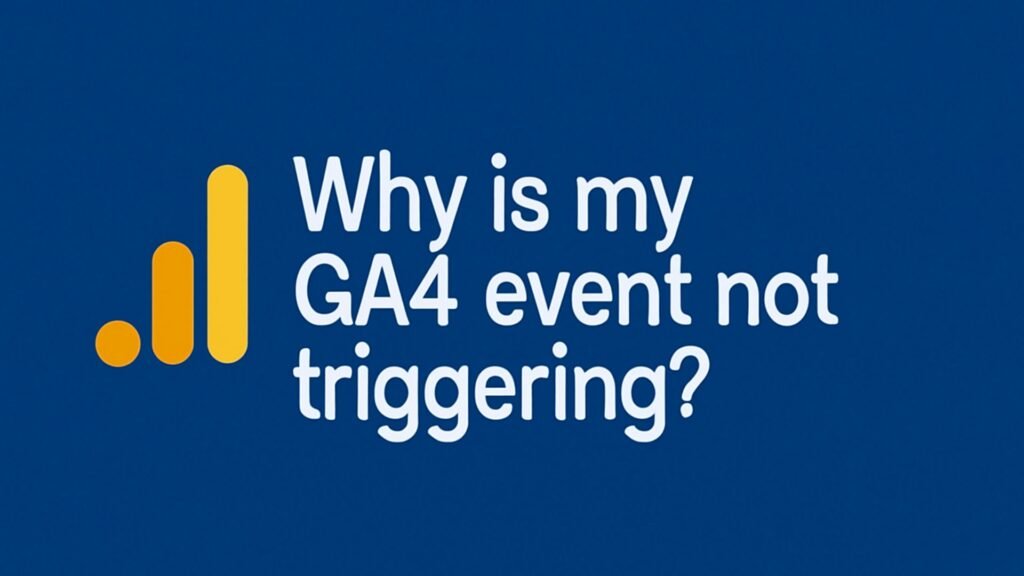If your GA4 event isn’t triggering, it’s usually due to incorrect tag setup, missing triggers, or tracking conflicts. This guide covers the most common causes and detailed troubleshooting steps to ensure your events fire correctly.

Why Is My GA4 Event Not Triggering?
Google Analytics 4 (GA4) events are crucial for tracking user interactions beyond basic page views.
When your event doesn’t trigger as expected, it creates gaps in your data, making it difficult to measure engagement, conversions, and user behavior.
There are many reasons why GA4 events might fail to trigger.
In this in-depth guide, we’ll explore common causes, diagnostic steps, and best practices to get your event tracking firing reliably.
Understanding GA4 Event Tracking Basics
GA4 events are custom or automatic interactions sent to Google Analytics from your website or app. Events can be:
- Automatically collected (page_view, scroll, click).
- Recommended events (sign_up, purchase).
- Custom events you define.
Events are sent via the GA4 tag, often implemented with Google Tag Manager (GTM) or directly through JavaScript.
Common Reasons GA4 Events Don’t Trigger
1. Incorrect Tag or Trigger Configuration in Google Tag Manager
- The tag (usually a GA4 Event tag).
- The trigger (what causes the tag to fire).
Common mistakes:
- The trigger is not linked or misconfigured.
- Trigger conditions don’t match actual user behavior.
- Tag firing conditions conflict with other tags or trigger settings.
How to fix:
- Verify the event tag is set up correctly with the right GA4 Measurement ID.
- Check the trigger configuration matches the intended event (e.g., Click Trigger targeting correct elements).
- Use Preview mode in GTM to test if the tag fires during interactions.
2. GA4 Tag Not Installed or Firing Properly
If the GA4 base tag (configuration tag) isn’t present or firing on your page, event tags won’t send data.
Fix:
- Confirm your GA4 configuration tag is firing on all pages.
- Use Google Tag Assistant or GA4 DebugView to check tag firing.
- Ensure your Measurement ID is correct.
3. JavaScript Errors Blocking Tag Execution
JavaScript errors on your page can prevent GTM or direct GA4 code from running.
Fix:
- Open browser console (F12 > Console tab) and check for errors.
- Fix any errors, especially those related to GTM or analytics.js/gtag.js.
- Test after resolving errors.
4. Incorrect Event Parameters or Naming
GA4 expects events and parameters to follow naming conventions. Misspelled or invalid names may cause data loss.
Fix:
- Check event names and parameter keys for typos.
- Avoid using spaces or special characters; use underscores or camelCase.
- Follow GA4 event naming guidelines.
5. User Consent or Cookie Restrictions
With privacy laws (GDPR, CCPA) and browser settings, users may block cookies or consent may be required before tracking.
Fix:
- Ensure your consent management tool allows firing GA4 tags after user consent.
- Use GTM Consent Settings to delay tags until allowed.
- Check if events fire for users who have consented.
6. Duplicate or Conflicting Tags
Having multiple GA4 configurations or event tags firing on the same page without coordination can cause conflicts.
Fix:
- Audit your GTM workspace and site code for duplicate GA4 tags.
- Remove redundant tags or consolidate events within one tag.
- Test in preview to ensure single firing per event.
7. Single Page Application (SPA) Issues
If your site uses SPA frameworks (React, Angular, Vue), GA4 may not detect page changes or events without manual configuration.
Fix:
- Implement history change or virtual pageview triggers in GTM.
- Manually push events to the dataLayer on route changes.
- Ensure events trigger on relevant virtual page loads.
8. Incorrect Use of Measurement Protocol or API
If sending events via server-side API or Measurement Protocol, improper formatting or missing authentication can block event reception.
Fix:
- Follow Google’s Measurement Protocol documentation.
- Validate payload structure and required parameters.
- Monitor API response codes for errors.
Troubleshooting Step-by-Step Checklist
- Confirm the GA4 configuration tag is firing on all pages.
- Verify your event tag is linked to the correct trigger.
- Use GTM Preview mode to test tag firing live.
- Check the browser console for JavaScript errors.
- Validate event names and parameters for correctness.
- Review cookie consent and privacy settings.
- Audit for duplicate or conflicting tags.
- Adapt the setup for SPA or dynamic content sites.
- Test Measurement Protocol payloads (if applicable).
Real Example
A client reported that their “Add to Cart” event was not triggering on their React-based eCommerce site.
We found that the SPA routing wasn’t triggering GTM pageview events, so the event tag never fired.
After implementing a custom history change trigger and pushing the event manually to the data layer, the Add to Cart event tracked perfectly.
How Socinova Can Help?
At Socinova, we specialize in GA4 setup, troubleshooting, and optimization. If your events aren’t firing or your data feels incomplete, we’ll audit your tags, debug conflicts, and implement best practices to get your tracking firing accurately.
Need help fixing your GA4 events? Contact us here and let’s get your data flowing right.
Conclusion
If your GA4 event isn’t triggering, it usually means there’s a problem with tag setup, trigger configuration, or technical conflicts.
By carefully reviewing your tags, triggers, permissions, and page scripts, you can identify and fix the issue.
Proper testing with tools like Google Tag Manager Preview and GA4 DebugView helps ensure your events fire reliably. Consistent event tracking is key to accurate data and smarter marketing decisions.
If you’re still facing challenges, experts like Socinova can help audit and optimize your GA4 setup to get your event tracking working smoothly.




